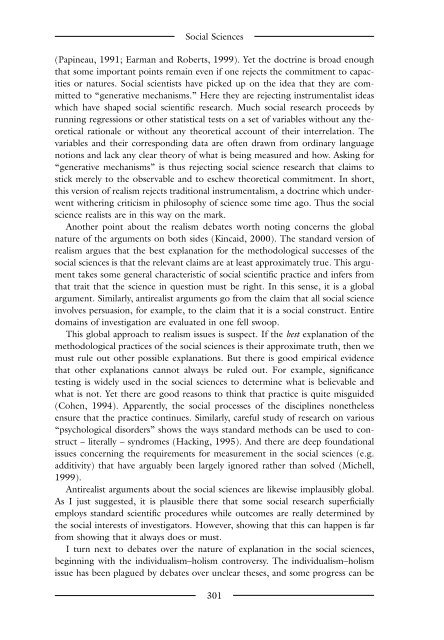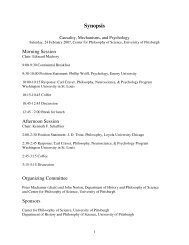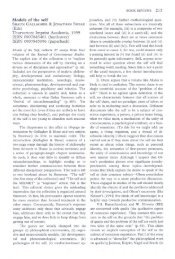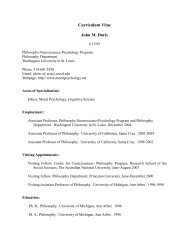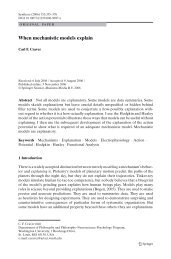The Blackwell Guide to the Philosophy of Science - The Department ...
The Blackwell Guide to the Philosophy of Science - The Department ...
The Blackwell Guide to the Philosophy of Science - The Department ...
You also want an ePaper? Increase the reach of your titles
YUMPU automatically turns print PDFs into web optimized ePapers that Google loves.
Social <strong>Science</strong>s<br />
(Papineau, 1991; Earman and Roberts, 1999). Yet <strong>the</strong> doctrine is broad enough<br />
that some important points remain even if one rejects <strong>the</strong> commitment <strong>to</strong> capacities<br />
or natures. Social scientists have picked up on <strong>the</strong> idea that <strong>the</strong>y are committed<br />
<strong>to</strong> “generative mechanisms.” Here <strong>the</strong>y are rejecting instrumentalist ideas<br />
which have shaped social scientific research. Much social research proceeds by<br />
running regressions or o<strong>the</strong>r statistical tests on a set <strong>of</strong> variables without any <strong>the</strong>oretical<br />
rationale or without any <strong>the</strong>oretical account <strong>of</strong> <strong>the</strong>ir interrelation. <strong>The</strong><br />
variables and <strong>the</strong>ir corresponding data are <strong>of</strong>ten drawn from ordinary language<br />
notions and lack any clear <strong>the</strong>ory <strong>of</strong> what is being measured and how. Asking for<br />
“generative mechanisms” is thus rejecting social science research that claims <strong>to</strong><br />
stick merely <strong>to</strong> <strong>the</strong> observable and <strong>to</strong> eschew <strong>the</strong>oretical commitment. In short,<br />
this version <strong>of</strong> realism rejects traditional instrumentalism, a doctrine which underwent<br />
wi<strong>the</strong>ring criticism in philosophy <strong>of</strong> science some time ago. Thus <strong>the</strong> social<br />
science realists are in this way on <strong>the</strong> mark.<br />
Ano<strong>the</strong>r point about <strong>the</strong> realism debates worth noting concerns <strong>the</strong> global<br />
nature <strong>of</strong> <strong>the</strong> arguments on both sides (Kincaid, 2000). <strong>The</strong> standard version <strong>of</strong><br />
realism argues that <strong>the</strong> best explanation for <strong>the</strong> methodological successes <strong>of</strong> <strong>the</strong><br />
social sciences is that <strong>the</strong> relevant claims are at least approximately true. This argument<br />
takes some general characteristic <strong>of</strong> social scientific practice and infers from<br />
that trait that <strong>the</strong> science in question must be right. In this sense, it is a global<br />
argument. Similarly, antirealist arguments go from <strong>the</strong> claim that all social science<br />
involves persuasion, for example, <strong>to</strong> <strong>the</strong> claim that it is a social construct. Entire<br />
domains <strong>of</strong> investigation are evaluated in one fell swoop.<br />
This global approach <strong>to</strong> realism issues is suspect. If <strong>the</strong> best explanation <strong>of</strong> <strong>the</strong><br />
methodological practices <strong>of</strong> <strong>the</strong> social sciences is <strong>the</strong>ir approximate truth, <strong>the</strong>n we<br />
must rule out o<strong>the</strong>r possible explanations. But <strong>the</strong>re is good empirical evidence<br />
that o<strong>the</strong>r explanations cannot always be ruled out. For example, significance<br />
testing is widely used in <strong>the</strong> social sciences <strong>to</strong> determine what is believable and<br />
what is not. Yet <strong>the</strong>re are good reasons <strong>to</strong> think that practice is quite misguided<br />
(Cohen, 1994). Apparently, <strong>the</strong> social processes <strong>of</strong> <strong>the</strong> disciplines none<strong>the</strong>less<br />
ensure that <strong>the</strong> practice continues. Similarly, careful study <strong>of</strong> research on various<br />
“psychological disorders” shows <strong>the</strong> ways standard methods can be used <strong>to</strong> construct<br />
– literally – syndromes (Hacking, 1995). And <strong>the</strong>re are deep foundational<br />
issues concerning <strong>the</strong> requirements for measurement in <strong>the</strong> social sciences (e.g.<br />
additivity) that have arguably been largely ignored ra<strong>the</strong>r than solved (Michell,<br />
1999).<br />
Antirealist arguments about <strong>the</strong> social sciences are likewise implausibly global.<br />
As I just suggested, it is plausible <strong>the</strong>re that some social research superficially<br />
employs standard scientific procedures while outcomes are really determined by<br />
<strong>the</strong> social interests <strong>of</strong> investiga<strong>to</strong>rs. However, showing that this can happen is far<br />
from showing that it always does or must.<br />
I turn next <strong>to</strong> debates over <strong>the</strong> nature <strong>of</strong> explanation in <strong>the</strong> social sciences,<br />
beginning with <strong>the</strong> individualism–holism controversy. <strong>The</strong> individualism–holism<br />
issue has been plagued by debates over unclear <strong>the</strong>ses, and some progress can be<br />
301


